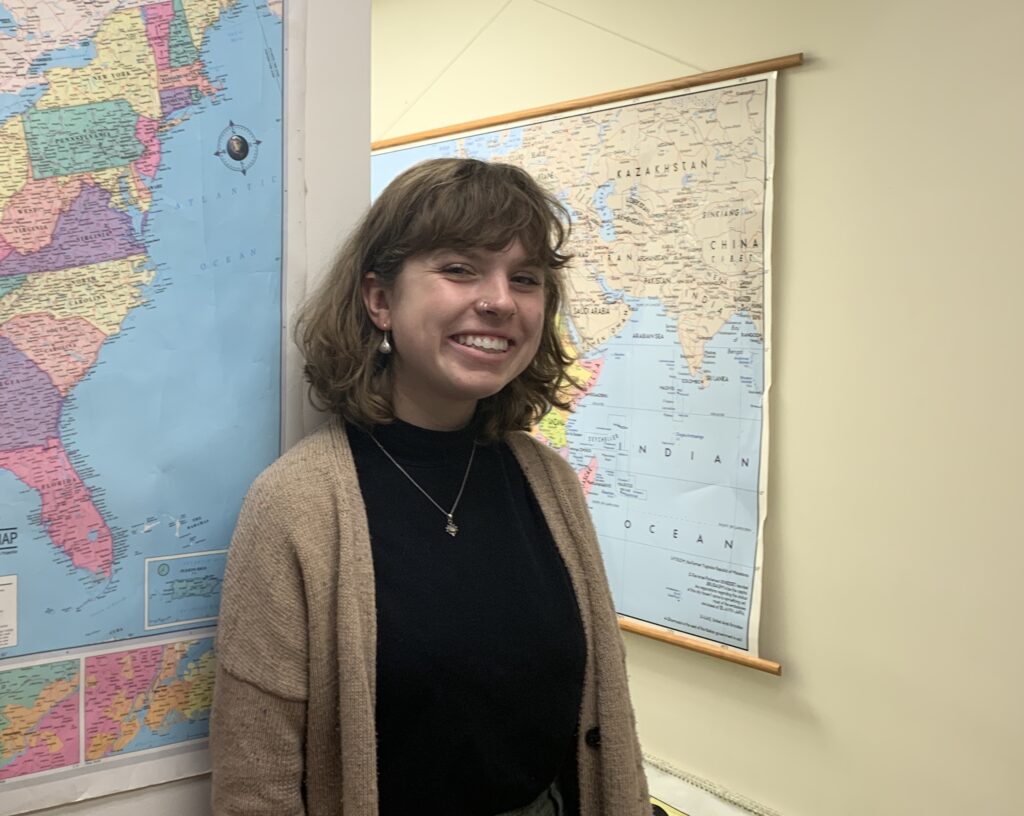By: Adelaide Szczesiul

Over the summer of 2019 and throughout the fall semester, I have been an intern for the Vermont Refugee Resettlement Program, which is a field office of the US Committee for Refugees and Immigrants in Colchester, Vermont. USCRI is devoted to assisting refugees and immigrants in receiving government benefits, finding jobs in their communities, and accessing educational services. My official title has been as the “Educational Empowerment Intern.” In this position, I have done a lot of administrative work (updating clients’ casenotes, tracking attendance for English classes, etc.). However, I also had the opportunity to conduct intake interviews, in which I talked with newly arrived refugees and assigned them to community-run English classes near their homes based upon their previous educational experiences. I attended and helped to teach English classes, and was even able to teach a class myself when a teacher needed a substitute one day in August. By assisting in classes, I’ve tried my best to communicate and form connections with people whose experiences and languages differ greatly from my own. As an anthropology major, I see cross-cultural communication as a skill that is invaluable, yet simultaneously impossible to perfect (I definitely have had a few slip-ups). I am grateful to have had this opportunity to connect with people I otherwise may never have met, and I do not doubt that I learned as much, if not more, from our time together as they did.
This experience has shown me how I can put the skills and knowledge I am developing in my anthropology classes to good use. In one of my classes, we have discussed the discipline of anthropology not as a rigidly-structured field of study in pursuit of objective truths, but as a unique frame of mind allowing for empathy and reflexivity, as well as critical reflection. I feel like an anthropologist when I am in the USCRI office not because I am conducting research, but rather because I am prompted to think like an anthropologist— this job has led me to practice empathy and strive to understand the experiences of people with whom I have little in common, including language, and to hold myself accountable when I make mistakes. But beyond empathizing with people on an individual level and reflecting on one’s own identity and positionality in relation to others, current anthropology is also about analyzing and working against unjust systems of power, such as the Trump administration’s “Muslim ban.”
My experience at USCRI has made me more aware than ever of the current political climate of the US, and its day-to-day impact on disenfranchised populations. The office is very quiet lately; with the Trump administration pushing to cut annual refugee admissions to nearly zero, every new arrival is a cause for celebration. The decrease in arrivals is, of course, not due to a decrease in people’s need for resettlement. The people who would be visiting our office and attending our English classes are out there, waiting to be allowed into our communities. I know that I will never forget the day USCRI was supposed to receive a large family from Somalia and due to Trump’s Muslim Ban, they never arrived. I’ve read heart-wrenching articles before about the thousands of families trapped for years in refugee camps, but it felt different to hold the paperwork of an individual family who was supposed to arrive on that day, to read their names and see their pictures and imagine the disappointment they must be feeling in that moment.
Because of this experience, I’ve decided that I want to continue advocating for and learning from refugees. I want to do what I can with the skills I have gained through anthropology to help push back against unjust systems of power, and through USCRI, I have discovered how I can make this happen. Several of the staff members at USCRI are Americorps VISTAs (Volunteers in Service to America). VISTAs receive government funding to work for a nonprofit for a year, usually spearheading some type of capacity-building project for the organization. I will graduate from UVM in May, and I am confident now that I want to be an Americorps VISTA the following year, hopefully working with refugee or immigrant populations wherever I am needed. I feel so lucky to have spent time at USCRI; not only has this experience supplied me with valuable knowledge and allowed me to practice the skills I have learned through anthropology, but it has also pushed me towards my next step. Though I know I will miss my time as a UVM student, I am now excited to continue working with nonprofits after graduation through Americorps.


Recent Comments